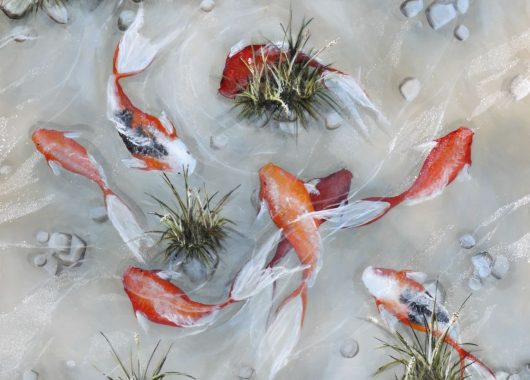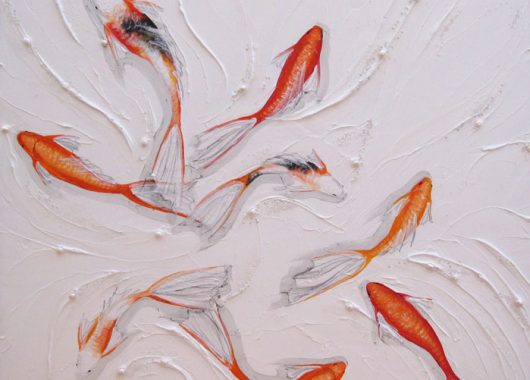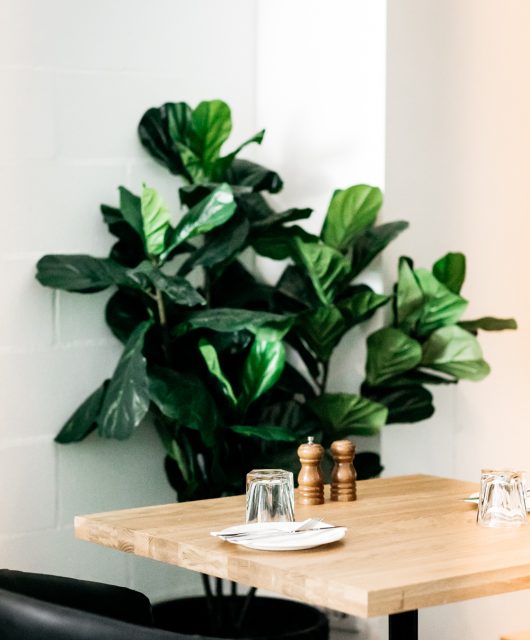When Australian-born artist Katrina Read found herself overwhelmed by client demands and unable to keep up with her own collection, she made a decision to stop everything in its tracks. “Integrity,” she says, sitting in the living room of her home in Vaucluse, “that’s what I stand for as an artist. It’s the most important thing I live by: my honesty and my integrity in my own works. You have to be authentic. You have to have your own voice and your own style.”
On the wall behind Katrina is one of her own paintings – of koi fish basking in a sun-touched, pebble-bottomed river. The soft whites and greens match the rest of the room, as though everything was designed to be part of a set. “I wanted to be surrounded by something that made me feel calm,” she says about her most well-known collection, the Prosperity series. Katrina was still finding her own style and dabbling in a variety of genres, from Australian landscapes to beach paintings to figurative works when she discovered twenty years ago that her paintings involving koi and water seemed to be embraced more or sold first.

“That sense of tranquillity, it’s universal. I’ve received letters from people who have been very unwell in the past, but found solace and relief in my paintings. So, I don’t commit to doing an artwork when I’m tired. Painting is a really emotive process and if the artist is being pushed, you can pick it up in the energy and in the work itself. If I can feel that my pieces are starting to lose authenticity, then I wait and I recharge my batteries first,” she reveals.
Inspired by the elements of nature and her own surroundings, Katrina started to experiment with light and depth in all her works. Indeed, it reflects the ancient Chinese philosophy of feng shui – a term that directly translates to “wind-water” in English. The system, in short, seeks to harmonise everyone with their surrounding environment, reminding Katrina to simply take a breath and relax amidst the activity of everyday life.

Katrina Read has been painting for as long as she can remember, having always been a creative talent, and it’s evident in the way she talks about her processes just how much respect she has for the practice. When working with a private client or an interior designer, she begins the journey with a personal home visit to get an idea of their space. “It’s really important for me to understand how they live,” she says, “because my painting has to be an accent to the room, one that ties in with the whole design story. It has to work in isolation but also fit in seamlessly with the client’s space.”
Reflecting back on herself at the beginning of her career, a word of advice she would give to those intent on finding success as an artist is to take a step back and enjoy the journey. She believes that it is always a long and complicated learning process in the beginning. “It’s not impossible to earn $40,000 per painting straight out of Uni, given the skill set of some talented individuals and the time involved in each piece, but the people who are paying money at that level want to see a career trajectory. They want to see that you’ve started and that you’ve built, and that you’ve gained experience. Even now when I look at my collection from ten years ago to where it is now, I’m staggered by the progress and the development in the works.”
For those who are struggling to reach their goals or elevate their career, she says: “Never underestimate the position that you’re in now and where that may take you in twenty years. Even if you can’t see the benefit of where you are now, there will be something in ten years’ time that will make you grateful for the experience.” Whether it’s a contact or a business skill or simply a word of advice, Katrina believes that inspiration and influences tend to strike when people least expect it. “It’s essential that you learn throughout the journey, even in moments that don’t feel significant. Draw from what you can learn from other creative talent, but get your own voice and maintain that. Spend time working out what your message is going to be, and what your style is,” she suggests. “And don’t be so hard on yourself. Everything happens in its own time.”










